De Nederlandse dichter Adriaan Roland Holst werd geboren op 23 mei 1888 in Amsterdam. Zie ook alle tags voor Adriaan Roland Holst op dit blog.
Er is een vrede
Er is een vrede die uit leed geboren
In ’t oog van vreugde als traan van teerheid beeft,
Of als een zachte glimlach glanzend zweeft
Over ’t gelaat dat vreugden heeft verloren.
Maar nimmer zal die vrede ’t leven schoren
Dat schuw voor ’t eigen hart in luidheid leeft,
Slechts wie de moed van eigen lijden heeft
Wordt tot de zaligheid dier vreê verkoren.
En als gij eens uw stil gelaat zult heffen
Naar dat nieuw licht boven verleden’s graf,
Roep dan mijn naam. – Ik zal uw roepen beiden.
O dan zal ik, ontroerd èn trots, beseffen
Dat ik mijn volste jeugd in liefde gaf
Aan ’t hart dat groter was dan liefdes lijden.
Wijdheid
Wijdheid van zijn is vrijheid van gedachten
In heldere open geest als lichtfontein
Opwaarts te stralen, en dan ijl en fijn,
Goudluchtig zwevend vocht, in daling zacht en
Overal neer te regenen – zoo rein
Als in de najaarsochtenden, na nachten
Van steromklaarde kou, de zon met prachten
Van goud doorsprenkelt sferenkristallijn.
’t Is de glimlach na luid gezongen jeugd –
Het ijl geluk dat glanzende eeuwigheid
Te ademen schijnt in een verstilde vreugd.
’t Is als een zee die na een wilden strijd
Met golven nu al ver de kim ontweken,
Vol zonweerspiegeling ligt gladgestreken.
De belijdenis van de stilte
I
Tijdloos Gelaat, dat boven diepten zwijgt
Waar ’t Leven wordt en sterft en stervend wordt
Went’lend…. Droom, waarheen alles eeuwig stijgt,
En Rots, waar eeuwig alles tegen stort.
Droom van mijn woord – Rots van mijn zang – ik weet
Hoe wijd de duizling van uw oogen leeft
Over het Al, en dat nooit vreugd’, nooit leed
Hun openheden oversluierd heeft.
Want als de tijd mij loslaat, en ik blijf
In duizelende zwevingen, tot ik
Plots’ uit de sidderingen van mijn lijf
Stijg, en in de eeuwigheid van ’t oogenblik
’t Eindeloos ruischen van uw zwijgen hoor
Door sferen, waar geen aardsche stem meer spreekt,
Voel ik dat zij mij aan en door zien, dóór
Tot in ’t hart van mijn hart, dat snikkend breekt.
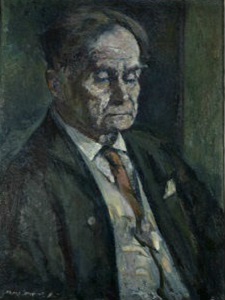
Adriaan Roland Holst (23 mei 1888 – 5 augustus 1976)
Portret door Kees Verwey, 1965
De Nederlandse schrijver Maarten Biesheuvel werd geboren in Schiedam op 23 mei 1939. Zie ook alle tags voor Maarten Biesheuvel op dit blog.
Uit: Port Churchill
“Op mijn veertiende jaar mocht ik van mijn vader een klein radiotoestel van de heer Feikema, onze gereformeerde buurman, kopen. Hij deed al jaren lang in radio’s. Hij kocht kapotte toestellen op, van de allerkleinste modellen tot bakbeesten toe, die minstens een vierde van de ruimte van een gemiddelde burgermanswoning vulden, en verkocht ze weer voor prijzen die variëerden van een rijksdaalder tot tachtig gulden. Hij was boekhouder bij een houtwerf in Schiedam en vulde nagenoeg al zijn avonden met het oplappen van oude radio’s. Hij woonde in hetzelfde blok ‘witte huizen’, (de meest riante arbeidershuizen die er na de oorlog in Schiedam zijn gebouwd: ze bestonden uit zes behoorlijk ruime kamers, een keuken en een douchecel, benevens een kelder die zo groot was dat men er met gemak twee amerikaanse automobielen uit de populaire middenklasse in had kwijt gekund. De huizen maakten in 1949 slechts f 48.56, – schrijve acht en veertig gulden en zes en vijftig cent – per maand).
De vrouw waar meneer Feikema mee was getrouwd probeerde op dringend aanraden van mijn moeder, toen ik zes jaar was, mij heen te helpen over de problemen van eeuwigheid, onbegrensd heelal, tijd en ruimte. Ze verkondigde de buurtbewoners dat ik over ‘mediamieke gaven’ beschikte. (Misschien heeft ze ook wel gelijk gehad: aan hallicunatoire toestanden heeft het mij tot nog toe niet ontbroken en ondanks een viertal rustigmakende pillen dat ik dagelijks slik, ben ik toch voortdurend in hoger sferen. In ieder geval zal ik nooit in het openbaar ‘voorspellingen doen’, hoewel ik iemand maar vijf minuten hoef te observeren om precies te weten hoe het hem ‘verder zal vergaan’). Ik geloof dat ik juist dat radiootje – veertig gulden – van mijn vader kopen mocht omdat hij wellicht hoopte dat ik, wanneer ik ’s nachts, wakker liggende en denkende over problemen waar knappere koppen dan ik ook nog niet uit zijn gekomen, zo verstandig zou zijn om dat ding aan te zetten zodat mijn geest een beetje verstrooid zou raken. Het was een uiterst klein bakelieten toestel, als ik het wel heb van het merk Philips. Ik had ten behoeve van het ontvangapparaat twaalf antennedraden in mijn kamer uitgezet. Ik kan me nog heel goed herinneren hoe ik de ligging van mijn kamer ten opzichte van de coördinaten van Moskou, Tashkent, Irkoetsk, Algiers, Teheran, Istanboel en andere exotische plaatsen naar de gegevens uit mijn eenvoudige Bos schoolatlas uitrekende.”
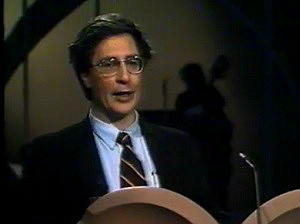
Maarten Biesheuvel (Schiedam, 23 mei 1939)
De Nederlandse schrijfster en columniste Lydia Rood werd geboren op 23 mei 1957 in Velp. Zie ook alle tags voor Lydia Rood op dit blog.
Uit: Sprong in de leegte
“Nagel op het bordje. Het was zo’n lentedag dat het lijkt te sneeuwen. Ik herinner me de wittige warreling in het bleke zonlicht en al wist ik niet wat het was, ik genoot van het wisselende licht en het gedwarrel tussen de tramdraden. Zaadhuisjes waren het, weet ik nu, niet wit maar bijna doorzichtig, met de zwarte pit van het zaadje in het hart, maar dat heb ik later pas geleerd. Ik keek naar buiten en zei met mijn rug naar de kamer dat mijn ouders geen kinderen meer wilden. Tegen mijn tante zei ik dat; ze was op kraamvisite. Later zeiden ze dat ik me dat onmogelijk kon herinneren, omdat ik amper één jaar oud was, maar ik herinner me details die zij niet meer weten, zoals de nagel die mijn tante verloor toen ze haar beschuit met muisjes at: opeens lag er een felroze nagel op het bordje en ik vond het raar dat ze daaronder nóg een nagel had, met een gewone kleur. Ik herinner me ook hoe kwaad ze waren (ik was zes) toen ik erover vertelde. Niet om het verhaal zelf, dat was onschuldig genoeg, maar omdat ik volhield dat ik het me herinnerde. Die dag, mijn zesde verjaardag, kwam ik er opnieuw achter dat de wereld niet was zoals ik haar zag, maar zoals zij die wilden zien. Ik leerde ook te zwijgen over wat ik wist. Maar daar gaat het nu niet over. Het punt was dat ik dus een zusje had. Ik was amper één, amper aan het leven gewend en daar was het al. Ze lieten het me zien, een in roze ingepakt rood hoofd, en zeiden dat het mijn zusje was en dat het Elsa heette. — 0, goed, zei ik, en ik draaide me om om te gaan spelen, ik weet niet met wat, blokken of zo, het was iets met kleuren. Ja, ik zei: ‘goed’. Niet ‘koe’ of zo, met veel kwijl, gewoon ‘goed’. Ik praatte al, daar ga ik me hier dus niet voor zitten schamen. Ik heb me genoeg gedeisd gehouden. Als mensen me kunnen zien, doe ik met ze mee, maar dit schrijf ik voor mezelf. En, misschien, voor Sal.
Terwijl ik naar de lentestorm keek, zei ik: Mama genoeg kindje. Oké, perfect Nederlands is dat niet, maar ik weet het nog letterlijk en ik weet ook verdomd goed wat ik ermee bedoelde: nu is het wel genoeg. Die ene, die pik ik dan wel. De eerste tijd was het ook wel oké. Dat ik een zusje had bedoel ik. Pas later vroeg ik me af waarom ze haar gewoon Elsa hadden genoemd en mij Cornélie, wat in de klas werd afgekort tot Nelie en thuis tot Cor, met zo’n naam vraag je daar toch om? Misschien waren ze wijs geworden toen ze eenmaal gemerkt hadden dat mijn zogenaamd mooie naam alleen maar verlelijkt werd, en wilden ze dat mijn zusje besparen.”

Lydia Rood (Velp, 23 mei 1957)
De Amerikaanse dichteres en vertaalster Jane Kenyon werd geboren op 23 mei 1947 in Ann Arbor, Michigan. Zie ook alle tags voor Jane Kenyon op dit blog.
Having It Out With Melancholy
5 ONCE THERE WAS LIGHT
Once, in my early thirties, I saw
that I was a speck of light in the great
river of light that undulates through time.
I was floating with the whole
human family. We were all colors — those
who are living now, those who have died,
those who are not yet born. For a few
moments I floated, completely calm,
and I no longer hated having to exist.
Like a crow who smells hot blood
you came flying to pull me out
of the glowing stream.
“I’ll hold you up. I never let my dear
ones drown!” After that, I wept for days.
6 IN AND OUT
The dog searches until he finds me
upstairs, lies down with a clatter
of elbows, puts his head on my foot.
Sometimes the sound of his breathing
saves my life — in and out, in
and out; a pause, a long sigh. . . .
7 PARDON
A piece of burned meat
wears my clothes, speaks
in my voice, dispatches obligations
haltingly, or not at all.
It is tired of trying
to be stouthearted, tired
beyond measure.
We move on to the monoamine
oxidase inhibitors. Day and night
I feel as if I had drunk six cups
of coffee, but the pain stops
abruptly. With the wonder
and bitterness of someone pardoned
for a crime she did not commit
I come back to marriage and friends,
to pink fringed hollyhocks; come back
to my desk, books, and chair.

Jane Kenyon (23 mei 1947 – 22 april 1995)
Ann Arbor, Michigan
De Britse schrijfster Susan Cooper werd op 23 mei 1935 geboren in Buckinghamshire. Zie ook alle tags voor Susan Cooper op dit blog.
Uit: Ghost hawk
“He had left his canoe in the river, tied to a branch of a low-growing cherry tree. Now there was green marshland ahead of him, all round the river’s last slow curve. He pushed his way through waist-high grass toward one of the three high places in the marshland, where trees grew. They were islands of trees, never visited; the duck hunters went only to the marsh. He had chosen this place months ago, and now was the day to come back. In a squawking flurry two ducks erupted ahead of him, flying low, but his bow stayed on his back; he would not hunt till later, on the way home. He reached the trees–a tangle of pin oak and cherry, sumac and hickory, juniper and birch–and threaded his way through the grabbing branches to the two rocks that marked the tree he had chosen. There it still was, beside the rocks, still the proper shape: the small bitternut hickory tree with its twin leading stems growing in a slender V. He gave the tree a respectful greeting, and explained what he was about to do. The woven birch-bark pouch was heavy round his neck. He took out the stone blade, a long, notched rectangle of flint with one edge chipped to a fine sharpness. This blade had belonged to the tomahawk used by his father and his grandfather, until its handle broke; nobody knew where it had come from or when it was made. It was very precious to him. Carefully he fitted the blade into the cleft between the tree’s two slim branches, twisting them together above it. Then, with tough strands of deer sinew from his pouch, he bound the joined branches tightly above the stone–so tightly that they would grow together as the years went by, enclosing the blade. To make a tomahawk for your son, you needed the stone blade, and the wooden shaft, and time. In my father’s day, there was still time. When he’d finished his binding, he thanked the small tree, and gave it good wishes to grow straight and strong. Then he went back across the marshland to his canoe. On the way he shot three ducks, for the feast celebrating the arrival of the baby son who had been born early that day. I was that son. Because Flying Hawk was my father, the name they were giving me was Little Hawk.”
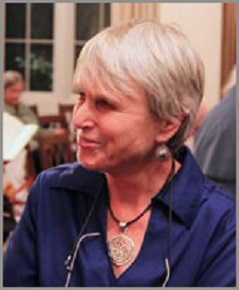
Susan Cooper (Buckinghamshire, 23 mei 1935)
De Vlaamse dichter Michaël Vandebril werd geboren op 23 mei 1972 in Turnhout. Vandebril studeerde rechten. Zie ook alle tags voor Michaël Vandebril op dit blog.
Duran Adam (staande man)
stilstaan is niet achteruitgaan
het is standhouden
ik ben gewoon iemand
als ze me weghalen
zal iemand anders mijn plaats
innemen sta op en
schrijf woorden van een dichter
op je voorhoofd: blake
whitman pasolini vinkenoog
of van vliet: het wordt tijd
dat wij orde op zaken stellen
woede verzamelen
druk ons de kop in en we
schieten dieper wortel
u wil zo graag dat we zwijgen
wel we zwijgen
als vermoord wij zijn de muur
waar u tegen loopt
ik herken de wapens
en laat ze liggen dit is ons leven
en dit is de tijd die we veil hebben
voor onze vrijheid
het spijt me u te moeten storen
maar mijn wereld brandt
Inat
voor Gavrilo Princip
het heeft geen naam brandt
in mijn ogen zoals een gedicht
dat je luidop zingen kan
maar geen titel verdraagt
ik heb genoeg aan een handdruk
om te weten hoe laat het is
deze leugenachtige dag zal driemaal kraaien
om me te herinneren aan mijn heldendom
de uren kruipen voorbij langs dit café traag
en ondiep als het bruine water van de miljacka
ik kijk in de spiegel van een nieuwe tijd en zie
het avondland dat als een deken valt over mijn stad
in de verte dendert een slee
over de kasseien het geluid vult
mijn lege ziel die duizend muren
zal doorboren om tot u te komen
als een zwarte vogel die neerstrijkt
op het eeuwig smeulende veld
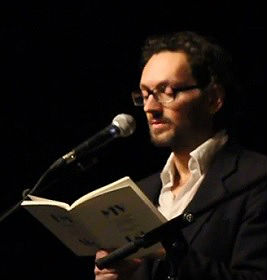
Michaël Vandebril (Turnhout, 23 mei 1972)
De Amerikaanse schrijver en slam poet Jack McCarthy werd geboren op 23 mei 1939 in Massachusetts. Zie ook alle tags voor Jack McCarthy op dit blog.
Riding Waves (Fragment)
II. Picking the Wave
The waves you want are waves
that don’t break all at once,
begin their break well out,
then gather force, a landslide 0f the water.
The slowly swelling approaching thunder,
rather than the sudden nearby crash.
On a good day, the right wave is the wave
that’s going to break just after passing you.
If you stood your ground,
it would hit you with a slapping sound.
If foam is forming lazily at the crest,
you are too late, let this one go. It must
be taken in the instant prior to the foam.
The right wave is curved like a bow,
up and outward from you (you are its arrow).
Its face is smooth rather than rough, .
the little surface ripples all resolved.
If you could not see it you could feel it
by the accelerating outward rush
of suddenly shallow water about your legs.
If the wave has foam on its face
from a wave that broke before it,
further out, this is a good omen.
Perhaps the best of all is the wave
that is broader at its base than most,
that is in fact two waves,
for the second will ride piggy-back on the first,
absorb all its momentum,
then break itself with reckless speed and power—
this even though neither wave was by itself
exceptional.
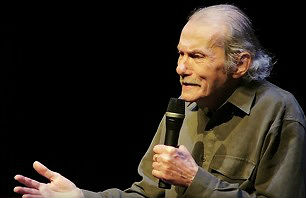
Jack McCarthy (Massachusetts, 23 mei 1939)
De Amerikaanse schrijver, journalist en radiopresentator Mitchell David Albom werd geboren op 23 mei 1958 in Passaic, New Jersey. Zie ook alle tags voor Mitch Allborn op dit blog.
Uit:The Five People You Meet in Heaven
“With 50 minutes left on earth, Eddie took his last walk along Ruby Pier. He passed an elderly couple.
“Folks,” he mumbled, touching his cap.
They nodded politely. Customers knew Eddie. At least the regular ones did. They saw him summer after summer, one of those faces you associate with a place. His work shirt had a patch on the chest that read Eddie above the word Maintenance, and sometimes they would say, “Hiya, Eddie Maintenance,” although he never thought that was funny.
Today, it so happened, was Eddie’s birthday, his 83rd. A doctor, last week, had told him he had shingles. Shingles? Eddie didn’t even know what they were. Once, he had been strong enough to lift a carousel horse in each arm. That was a long time ago.
“Eddie!” . . . “Take me, Eddie!” . . . “Take me!”
Forty minutes until his death. Eddie made his way to the front of the roller coaster line. He rode every attraction at least once a week, to be certain the brakes and steering were solid. Today was coaster day — the “Ghoster Coaster” they called this one — and the kids who knew Eddie yelled to get in the cart with him.
Children liked Eddie. Not teenagers. Teenagers gave him headaches. Over the years, Eddie figured he’d seen every sort of do-nothing, snarl-at-you teenager there was. But children were different. Children looked at Eddie — who, with his protruding lower jaw, always seemed to be grinning, like a dolphin — and they trusted him. They drew in like cold hands to a fire. They hugged his leg. They played with his keys. Eddie mostly grunted, never saying much. He figured it was because he didn’t say much that they liked him.
Now Eddie tapped two little boys with backward baseball caps. They raced to the cart and tumbled in. Eddie handed his cane to the ride attendant and slowly lowered himself between the two.
“Here we go . . . . Here we go! . . . ” one boy squealed, as the other pulled Eddie’s arm around his shoulder. Eddie lowered the lap bar and clack-clack-clack, up they went.
A story went around about Eddie. When he was a boy, growing up by this very same pier, he got in an alley fight. Five kids from Pitkin Avenue had cornered his brother, Joe, and were about to give him a beating. Eddie was a block away, on a stoop, eating a sandwich. He heard his brother scream. He ran to the alley, grabbed a garbage can lid, and sent two boys to the hospital.”
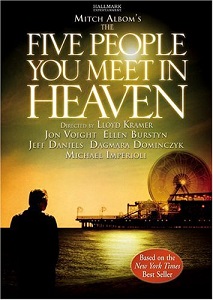
Mitchell Albom (Passaic, 23 mei 1958)
Cover
De Zweedse schrijver Pär Fabian Lagerkvist werd geboren in Växjö op 23 mei 1891 in Stockholm. Zie ook alle tags voor Pär Lagerkvist op dit blog.
Uit: Barabbas (Vertaald door Alan Blair)
“Yes, he was indeed the one the son of God had died for! It was to him and no other that it had been said:—Release this man and crucify me! Such were Barabbas’s thoughts as he walked away after trying to be one of them, as he strode away from the potter’s workshop in Potters’ Lane, where they had so plainly shown that they did not want him among them. And he decided to go and see them no more. But next day, when he turned up again notwithstanding, they asked what it was in their faith that he didn’t understand; showing clearly that they felt sorry and reproached themselves for not having welcomed him properly and been glad to give him the knowledge for which he was thirsting. What was it he wanted to ask them about? That he didn’t understand? Barabbas was on the point of shrugging his shoulders and replying that the whole thing was a mystery to him and, in fact, he couldn’t be bothered with it. But then he mentioned that a thing like the resurrection, for instance, he found hard to grasp. He didn’t believe that there was anyone who had risen from the dead. Glancing up from their potters’ wheels, they looked first at him and then at each other. And, after whispering amongst themselves, the eldest among them asked if he would like to meet a man whom their Master had raised from the dead? If so, they could arrange it, but not before the evening after work, as he lived some little way outside Jerusalem. Barabbas was afraid. This was not what he had expected. He had imagined they would argue about it and put forward their point of view, not try and prove it in such a pushing way. True, he was convinced that the whole thing was some queer fancy, a pious swindle, and that actually the man had not been dead. He was afraid all the same. He was not a bit keen on meeting the man. But he couldn’t very well say so. He must pretend he was grateful for the chance of convincing himself of their Lord and Master’s power. He put in time by walking about the streets in a state of mounting agitation. When he returned to the workshop at closing-time, a young man accompanied him out through the city gates and up towards the Mount of Olives. The man they sought lived on the outskirts of a little village on the slopes of the mountain. When the young potter drew aside the straw mat over the doorway they saw him sitting inside with his arms in front of him on the table and gazing straight out into the room. He seemed not to notice them until the young man greeted him in his clear voice. Then he slowly turned his head towards the door and returned their greeting in a curiously flat tone.“
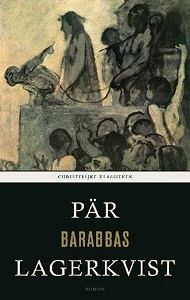
Pär Lagerkvist (23 mei 1891 – 11 juli 1974)
Cover
Zie voor nog meer schrijvers van de 23e mei ook mijn blog van 23 mei 2015 deel 2.
